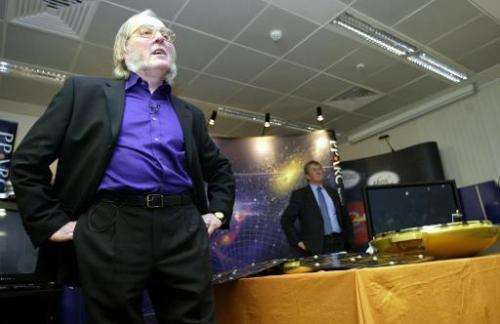Mars mission scientist Colin Pillinger dies

British planetary scientist Colin Pillinger, the driving force behind the ill-fated Beagle 2 mission to Mars, died on Thursday at the age of 70, his family said.
The professor, hailed by his colleagues as an inspirational figure with boundless enthusiasm for his subject, suffered a brain haemorrhage on Wednesday.
"It is with profound sadness that we are telling friends and colleagues that Colin, whilst sitting in the garden yesterday afternoon, suffered a severe brain haemorrhage resulting in a deep coma," his family said.
The father of two was taken to a hospital near his home in Cambridge, eastern England, and died peacefully on Thursday afternoon.
"We ask that all respect our privacy at this devastating and unbelievable time," his family said.
Pillinger, who cut a distinctive figure with his mutton-chop whiskers, studied in Wales and began his career at the US space agency NASA, analysing samples of moon rock on the Apollo programme.
But he won fame for his lead role in developing Beagle 2, a British lander that rode piggy-back to Mars aboard the European Space Agency's Mars Express in 2003.
Named after Charles Darwin's ship HMS Beagle, it was shaped like a giant pocket watch and opened to reveal solar panels, a robotic arm and research equipment designed to search for signs of life.
It should have landed on the red planet on Christmas Day 2003 but never made contact with Earth. A later investigation concluded that it probably burned up in the atmosphere of Mars.
In the early days and weeks after it disappeared, Pillinger remained relentlessly optimistic and his terrier-like enthusiasm made him a popular figure on British television.
Pillinger was diagnosed with multiple sclerosis in 2005, and the same year stepped down from his role as head of the Planetary and Space Sciences Research Institute (PSSRI) which he had founded at the Open University.
But while the MS left him with difficulty walking, he continued working in space science and remained hopeful of attempts to get to Mars, saying "we have unfinished business" on the planet.
He had been involved in the ESA's Rosetta project, a mission to orbit and land on a comet which is expected to be completed by the end of next year.
"Colin was driven by science but especially the will to establish whether Mars had, has or could have sustained life," said Professor David Southwood, president of the Royal Astronomical Society and Pillinger's friend.
"That will was expressed in enthusiasm, wit and tireless work and was infectious. He touched many lives and careers. He will be much missed."
© 2014 AFP



















